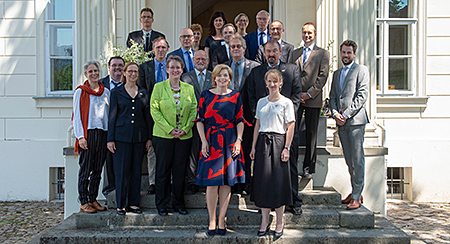You are here:
Federal minister Julia Klöckner visits German Federal Institute for Risk Assessment
20/2019, 04.06.2019
Exchange of knowledge on duties and projects of the BfR
What's in our food? This was one of the questions that federal minister Julia Klöckner followed up on in the BfR MEAL study kitchen (Meals for the exposure estimation and analysis of foods) during her visit to the German Federal Institute for Risk Assessment (BfR) on 4 June 2019. For the first time in Germany, this project sponsored by the Federal Ministry of Food and Agriculture (BMEL) examines systematically and on a large scale which substances are contained in which quantities in prepared foods. "Food safety is not negotiable and the same applies to animal feeds, products and chemicals. Whatever is sold here in Germany must be safe. Independent, reliable and sound risk assessments are therefore indispensable where the protection of consumer health is concerned. These data and facts are the base of our political decision making, and they have to be! Thanks to its scientific competence in combination with successful communication, the German Federal Institute for Risk Assessment has gained a great deal of credibility. A current beacon of this is the MEAL study, which my ministry is sponsoring to the tune of 13 million euros over a period of seven years. For the first time, it is being examined in detail which influence the preparation of food has on the substances it contains. Ingredients are being analysed for the first time in the state in which they are actually eaten. This is another milestone on the way to strengthening consumer health protection in Germany," explains Federal Minister of Food and Agriculture, Julia Klöckner.

On a tour around the study kitchen, BfR scientists demonstrated how foods are converted into meals the way they are typically served in Germany. In a study set to last for seven years, the BfR MEAL team will be examining roughly 60,000 foods for almost 300 desired and undesired substances. "We have a high level of food safety in Germany and Europe. With research projects like the BfR MEAL study, we are helping to improve it even further as we find out more and more about the actual composition of our food," says BfR President Professor Dr. Dr. Andreas Hensel. The first results are to be published in the course of 2019.
BfR MEAL study website:
The BfR MEAL study is the first total diet study for Germany. To conduct the study, the team is purchasing more than 90 percent of the foods most commonly eaten in Germany, processing them into meals in their own study kitchen and preparing them for subsequent analysis in the laboratory. The BfR MEAL study is the most comprehensive total diet study anywhere in the world. The substances examined form a wide spectrum, from mycotoxins, heavy metals, pesticides and mineral substances to substances that migrate from packaging materials. These include substances for which only very little data has been available in processed foods up to now, if at all, so that risk assessments can now be conducted for the first time.
During the field phase which just finished, the scientists examined foods for heavy metals, nutrients and mycotoxins among other things. Approximately 135,000 individual results are available from the field phase which are now to serve as the basis for better recognising possible health risks posed by the consumption of food.
About the BfR
The German Federal Institute for Risk Assessment (BfR) is a scientifically independent institution within the portfolio of the Federal Ministry of Food and Agriculture (BMEL) in Germany. It advises the Federal Government and Federal Laender on questions of food, chemical and product safety. The BfR conducts its own research on topics that are closely linked to its assessment tasks.
This text version is a translation of the original German text which is the only legally binding version.
